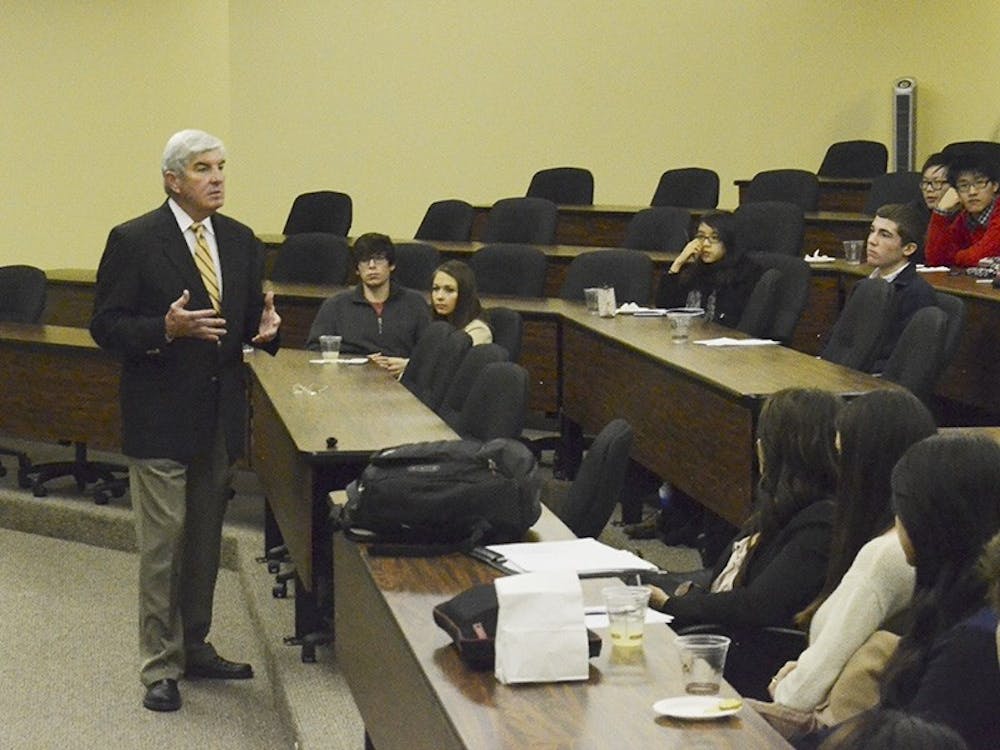Rydzewski speaks to students in Global Perspectives Series
USC professor Frank Rydzewski once promoted himself to vice president of his company before a business meeting with a Latin American executive.
As Rydzewski explained to students in a lecture at the Darla Moore School of Business Monday night, companies in that region tend to be hierarchical, and an American sales manager would not have been granted a meeting with a CEO unless he had a similar title. Before his business trip, he made himself a new business card. His strategy worked, and he secured the deal.
Rydzewski was the second speaker in the Global Perspectives Series hosted by the International Business and Chinese Enterprise Organization. The goal of the series is to provide a more inclusive perspective on global business.
“What we’re trying to do is raise awareness ... and also give these amazing professors that we have an outlet to speak about whatever interests them and not really be constrained by a classroom environment,” said Jason Sigmon, a third-year international business and global supply chain student who serves as the organization’s president.
The series will continue after spring break with Chuck Kwok, a professor in the international business department who will discuss basics of doing business in China March 27. It will conclude March 29 with Robert Cox, who will discuss whether Europe can recover from financial crisis.
Rydzewski, who joined the Moore School in January 2012, has 32 years of experience in finance and operations. The former CEO called Latin America a land of opportunity, especially for young people in Spain, where the unemployment rate for recent college graduates is nearly 50 percent.
Much of his lecture focused on the importance of understanding cultural differences between the United States and Latin America and within Latin America. Personal relationships are critical to business success, and he suggested taking time to tour a city prior to having a meeting there.
“I’m not just a gringo coming down there to close a business deal very, very quickly,” Rydzewski said. “I’ve taken some time. Read about the local football teams ... Know some of the basic words — beer, thank you, good morning, good evening, all those types of things.”
The professor called Mexico and Brazil the “big elephants” because about 53 percent of Latin America’s population is concentrated there. But he added that Argentina, Chile and Uruguay lead the way in development.
All of those nations have a collectivist mentality that contrasts with the individualism of the U.S., and concepts of time and space are markedly different. Listening habits also differ from the norm in the U.S. Rydzewski said he once prepared a 30-minute presentation for a Mexican executive who announced within 10 minutes that he would buy the product and left the room.
While corruption continues to be a significant problem in many Latin American countries — the speaker said his company lost deals multiple times because of its refusal to pay bribes — he mentioned several areas where the business climate has improved, including an increase of opportunities for women and a decrease in crime.
Rydzewski warned that companies should not assume anything about countries where they would like to do business, citing Home Depot’s and JC Penney’s failures in Chile due to their lack of cultural understanding. He urged students to take both deep-rooted traditions and current events of a nation into account if international business was their chosen career path.
“Someone can’t say, ‘If you know one country, you know them all,’” Rydzewski said. “You really don’t.”

